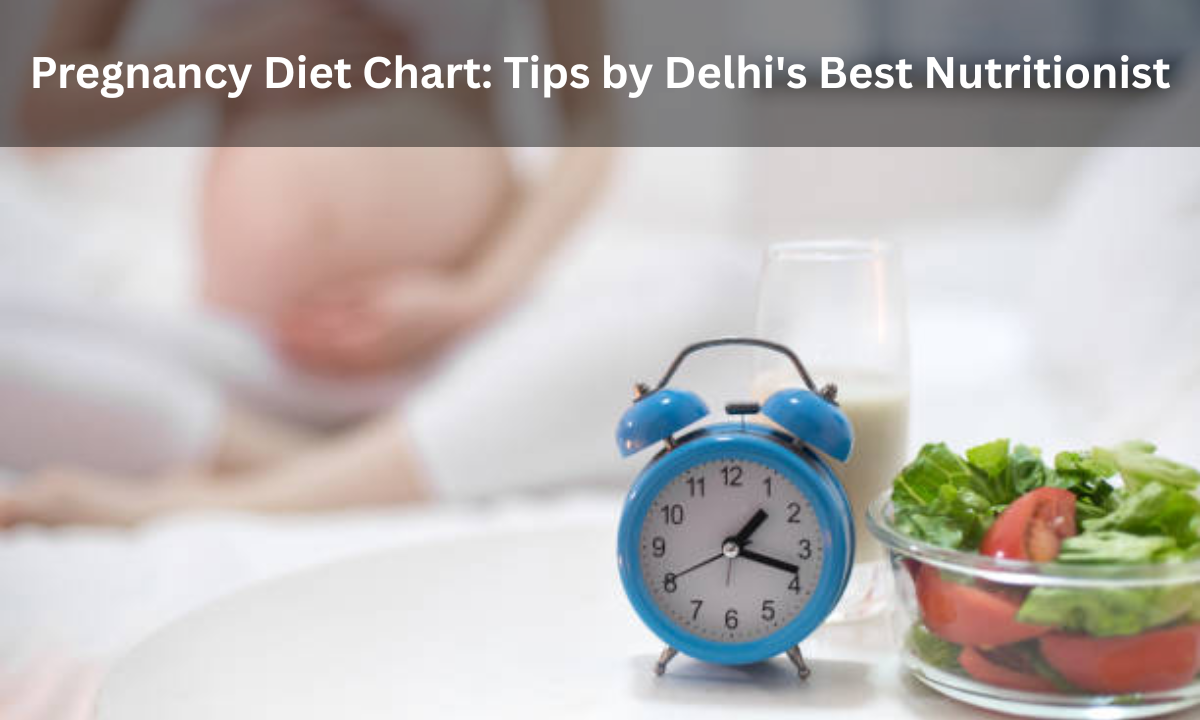Pregnancy is a special time when your body needs extra care and the right food for your baby’s growth. Are you wondering what to eat during pregnancy tostay healthy?
I am Avni Kaul, a leading pregnancy Dietician in Delhi. Here is a simple Indian pregnancy diet chart with practical tips to keep you and your baby healthy throughout these nine months.
Why is a Good Diet Important During Pregnancy?
Eating healthy foods during pregnancy helps:
- Baby’s proper growth and development: Your baby’s brain, bones, and organs need nutrients to develop well.
- Maintain your energy levels: Pregnancy can make you feel tired easily. Eating right keeps you active.
- Prevent problems like nausea, acidity, and constipation: Balanced meals help reduce these common issues.
- Keep your weight gain under control: Healthy weight gain is important for your baby’s and your health.
When you eat balanced meals daily, you prepare your body for delivery and recovery after birth.
Indian Pregnancy Diet Chart
This is a general diet chart suitable for most pregnant women. Adjust portions based on your hunger. Always consult your doctor or Dietician for personal health needs, especially if you have thyroid, diabetes, or other conditions.
Early Morning (6-7 AM)
- A glass of warm water: Helps digestion and removes toxins from your body.
- 4-5 soaked almonds OR 2 walnuts: Good fats and omega-3 support your baby’s brain development.
Breakfast (8-9 AM)
- Vegetable poha with peas and carrots OR vegetable upma: Gives carbs, vitamins, minerals, and fibre.
- 1 glass of milk: Provides calcium and protein to keep your bones strong.
Why this combination? It gives you energy, calcium, protein, and folic acid, which are important in early pregnancy.
Mid-Morning Snack (11 AM)

- Seasonal fruit like banana, apple, orange, or pomegranate OR coconut water:
- Fruits provide vitamins, fibre, and natural sugars for energy.
- Coconut water keeps you hydrated and balances electrolytes.
Lunch (1-2 PM)
- 2 rotis with ghee: Healthy carbs with good fats for energy.
- Dal (lentils) or chole/rajma: Rich in protein and iron for the baby’s growth.
- Mixed vegetable curry (beans, carrots, spinach): Provides vitamins, minerals, and fibre.
- A small bowl of curd: Helps digestion and gives calcium.
Eat slowly and avoid overeating to prevent acidity or bloating.
Evening Snack (4-5 PM)
- Roasted makhana (fox nuts) or a handful of peanuts or vegetable soup with ginger:
- Makhana and peanuts are rich in protein and keep you full.
- Vegetable soup is light, nutritious, and ginger helps reduce nausea.
Dinner (7-8 PM)
- Rice with dal and sabzi OR 2 rotis with paneer curry and salad: Light but nutritious meals that provide carbs, protein, and fibre.
- Warm milk before sleeping: Helps relax your body and improves sleep quality.
Eat dinner early to avoid acidity at night. If you feel heavy after dinner, go for a short walk inside your house.
Hydration During Pregnancy
Staying hydrated is important to avoid constipation, dizziness, and headaches. Make sure you:
- Drink 8-10 glasses of water daily
- Include coconut water, lemon water, or buttermilk in your routine
- Avoid packaged juices with added sugar
Foods to Avoid During Pregnancy
There are certain foods you should avoid during pregnancy for your and your baby’s safety:
- Raw papaya and pineapple: May cause uterine contractions and risk of miscarriage.
- Too much tea or coffee: Limit to 1-2 cups a day to reduce caffeine intake.
- Street food: May cause infections or food poisoning due to unhygienic preparation.
- Raw eggs or unpasteurized milk: Can carry bacteria harmful to you and your baby.
- Processed junk foods: Chips, instant noodles, and fried snacks have no nutritional value and add empty calories.
Best Tips from Delhi Nutritionists
Here are my practical tips to keep your healthy pregnancy and easy:
- Eat small meals to avoid nausea and acidity: Large meals can make you feel uncomfortable.
- Drink plenty of water, coconut water, and lemon water: It keeps you hydrated and reduces dizziness.
- Take folic acid, iron, and calcium supplements as prescribed: These are important for your baby’s growth and your health.
- Include protein in every meal: It helps your baby’s development and keeps you strong.
- Avoid overeating – eat balanced, not double: Your baby needs nutrients, not extra calories.
- Rest well and stay stress-free: Sleep early and take short naps during the day if you feel tired.
Frequently Asked Questions
1. How much weight should I gain during pregnancy?
Most women need to gain 10-12 kg during pregnancy. It may vary based on your BMI. Always check with your doctor to track healthy weight gain.
2. Can I fast during pregnancy?
It is not recommended to fast during pregnancy as your baby needs regular nutrition. Consult your doctor before fasting for religious or other reasons.
3. Is it safe to eat fish during pregnancy?
Yes, but choose low-mercury fish like salmon, rohu, or pomfret. Avoid raw fish and high-mercury fish like king mackerel.
4. I feel constipated. What should I do?
Eat more fibre-rich foods like oats, whole wheat, vegetables, and fruits. Drink plenty of water and walk daily if your doctor permits.
Final Words
Eating healthy is the best gift you can give your baby. Follow a balanced diet with fruits, vegetables, whole grains, pulses, and dairy. Avoid junk food and stay hydrated.
Always talk to your doctor or a dietitian for a personalized pregnancy diet plan to match your health needs. If you need guidance, visit my page on Best Pregnancy Dietician and Nutritionist in Delhi, India, to know how I can support you in your pregnancy journey for a healthy and happy motherhood.


